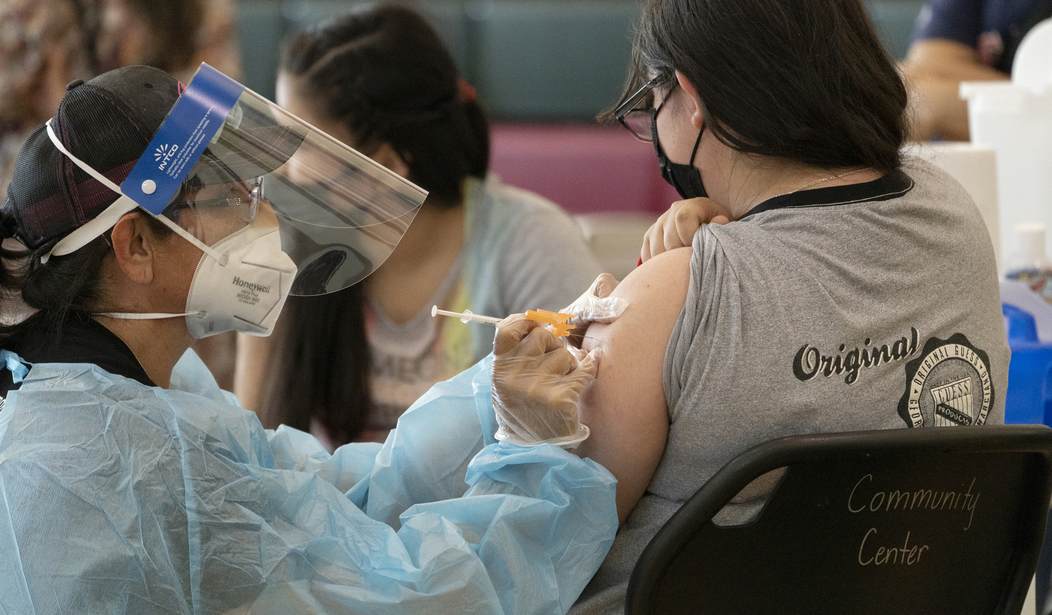You won’t believe what happened next unless you read this post from Saturday, in which case you’ll totally believe it.

We’re up to at least six countries that are coping with outbreaks despite having vaccinated a large percentage of their populations with one of China’s two “inactivated virus” vaccines, Sinopharm and Sinovac. Mongolia is actually ahead of America’s pace as measured by the share that’s fully immunized:

Mongolia got a late start on vaccinations, as you can see from the graph, but they’ve kept up a brisk pace over the past six weeks. They were just coming out of their first real wave of the pandemic when vaccinations began, which must have led them to assume they wouldn’t encounter a second one as immunity across the population began to build. Instead they went right back into a new wave of COVD. What gives?
Per the Times, scientists are eyeing their reliance on Sinopharm as a possible explanation:
Mongolia reported 1,312 new cases of the coronavirus on Wednesday as the country’s total infections neared 70,000, almost all recorded since January. New daily infections have risen more than 70 percent in the past two weeks, according to a New York Times database.
The landlocked nation has emerged as an outlier in the global scramble for vaccines among developing nations, securing enough doses for its eligible population thanks to its strategic location between Russia and China — two vaccine manufacturing giants with global ambitions. Mongolia has signed deals for 4.3 million doses of the Sinopharm vaccine and one million doses of Russia’s Sputnik V vaccine, although only 60,000 Sputnik doses have arrived so far…
“Inactivated vaccines like Sinovac and Sinopharm are not as effective against infection but very effective against severe disease,” said Ben Cowling, an epidemiologist and biostatistician at the University of Hong Kong School of Public Health.
Right, the issue with Sinopharm isn’t that it fails to protect the vaccinated person from illness, it seems, but rather that it doesn’t do a great job of preventing infection. That may leave vaccinated people capable of transmitting the virus to the unvaccinated, who are of course vulnerable to severe cases. In Saturday’s post I noted that the health minister of Bahrain, which is also using Sinopharm, said recently that 90 percent of people hospitalized in his country with COVID right now are unvaccinated. Bahrain has a high rate of vaccination too — even higher than Mongolia, per the second graph above — and yet they’ve gone through a nasty wave over the past month:

A country like the U.S. or Israel that’s using an mRNA vaccine may reach a degree of herd immunity much sooner than Mongolia or Bahrain do because mRNA recipients appear not to pass the virus on to unvaccinated people very much. In America, if you’re unvaxxed you may be safe-ish anyway if you live in a community with high vaccination rates because the virus will never reach you. In Mongolia, the fact that Sinopharm isn’t preventing transmission to the same degree means you may not be safe unless you’re vaccinated yourself.
Herd immunity could be a heavy lift with the Chinese vaccines, in other words.
In fact, countries using Sinopharm like Bahrain are already recommending a third dose to ensure protection since some recipients seem not to develop a strong immune response after the normal two-dose regimen. That’s a complaint in Hungary too, where Sinopharm is also in use:
There are more than 3.6 thousand members in the rapidly growing “People Vaccinated with Sinopharm with Negative Laboratory Tests,” closed Facebook group. The purpose of the group is to ensure testing and revaccination if necessary for people who have been vaccinated with the Sinopharm vaccine but have little to no antibodies in their immune system…
It is not only those above the age of sixty who have received negative antibody tests. Mariann, a mother of two, told Szabad Európa that she is only 36, but did not develop immunity either…
Virologist Miklós Rusvai told ATV Start that every fifth person above the age of 60 who has been vaccinated with Sinopharm does not develop immunity. Rusvai considers it crucial that if, four weeks following their second vaccination, an individual does not have enough antibodies in their system, they should receive a third vaccination with a different vaccine.
It’s a good thing the U.S. is buying and donating 500 million doses of Pfizer to countries around the world. Sinopharm recipients will need boosters of a shot that’s highly effective since the vaccine they’ve already been given isn’t, especially with the B.1.617 variant growing more prevalent internationally.
Speaking of which, here’s an ominous finding. The “Delta” variant is B.1.617, a.k.a. the Indian variant:
Takeover by Delta variant in Afghanistan despite very high serology from mid 2020 https://t.co/J0Zfoooa4k pic.twitter.com/xgul8BiDth
— COVID Impact (@CovidSerology) June 9, 2021
In other words, although many Afghans developed natural immunity by recovering from COVID before the Indian variant came along, cases are beginning to skyrocket there lately. That doesn’t mean people who had the disease are being reinfected; there are still millions there who are vulnerable because they weren’t infected previously. But early analysis suggests that B.1.617 is among the most immune-resistant strains of the virus, possibly second only to the South African strain. (Which is much less contagious.) The jury’s out on whether people with natural immunity are at any higher risk of reinfection from the Indian variant than from others. The UK’s experience over the next month will tell us more








